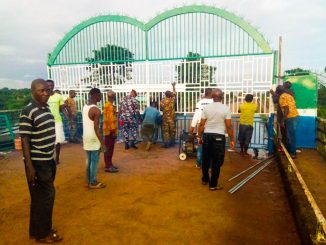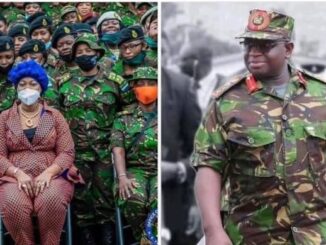
The Sierra Leone Government is facing serious financial crisis which has seen a catastrophic depreciation of the value of the national currency, the Leone, against major foreign currencies like the dollar and the pound.
Before Christmas, the value of the Leone dropped to over one million to 100 U.S. dollars. This was a tenuous situation that affected the purchase of foreign commodities and services and also caused scarcity of the dollar in the Sierra Leone banking system and markets and drew tremendous ire from the people who called for the firing of the Bank Governor, Kelfala Kallon and the Finance Minister, Jacob Jusu Staffa.
NIGERIAN newspapers are reporting that Bank Governor, Kelfala Kallon, has disclosed a plan for currency swap between Sierra Leone and Nigeria.
READ
_——_—————
The Chairman, Economic Community of West African States (ECOWAS) Committee of Governors of Central Banks, Prof. Kelfala Kallon, has disclosed a plan for currency swap between Nigeria and Sierra Leone.
Kallon, who is presently the Governor, Bank of Sierra Leone, also decried the increasing dollarisation of West African economies and subsequent depreciation of national currencies in the region.
Recall that the Central Bank of Nigeria (CBN), and Peoples Bank of China (PBoC), had in 2018, agreed on a currency swap worth $2.5 billion to reduce their reliance on the U.S. dollar in bilateral trade.
The agreement is aimed at providing sufficient local currency liquidity for Nigerian and Chinese industrialists and other businesses and to reduce difficulties as they search for a third currency.
The deal, purely an exchange of currencies, also will make it easier for Chinese manufacturers seeking to buy raw materials from Nigeria to obtain naira, the Nigerian currency, from Chinese banks to pay for their imports.
In a report by the Nigerian Investment Promotion Commission (NIPC), obtained by The Guardian in Abuja, Kallon said Sierra Leone decided to go ahead with the swap policy with Nigeria as its leading economic partner.
The report, however, indicates that the policy is still under planning and consultations between the two are in progress, noting that the Sierra Leonean financial sector is dominated by Nigerian banks and institutions; as such the policy will benefit both countries by removing the dollar as a factor in their trade relations.
He said: “We are engaged in deep discussions with my brother, Godwin Emefiele, and we are forming up the plan, and we will take the plan further.
“Since Nigeria already has a currency swap arrangement with China, Sierra Leone will key into that arrangement. Sierra Leonean import from China can now be done with Naira; this is why we are really interested in the immediate swap deal between Nigeria and Freetown.”
Kallon explained how the proposed swap deal will work: “For instance, a Sierra Leonean trader coming to Conakry would go into the parallel foreign exchange market in Sierra Leone to acquire dollars (at a premium, most times) to bring to Conakry to convert into Guinean francs (mostly at a discount) in order to purchase her wares.
“This transaction then increases the demand for dollars in Sierra Leone, and its supply in Guinea. The result would be a depreciation of the Leone against both the dollar and the Guinean franc, and the appreciation of the Guinean franc against both the Leone and the dollar. When the transaction is reversed (with a Guinean trader going to Freetown to purchase rice, for example), the fortunes of the Leone and Guinean franc would be reversed relative to each other and to the dollar.”
He continued: “This artificially-induced depreciation of our currencies then creates an expectation of future depreciations, which promotes speculation-induced hoarding of dollars. Like negative shocks, this adversely impacts macroeconomic stability in the region.
“We can mitigate against these outcomes by holding each other’s currencies as reserves to facilitate intra-ECOWAS trade, under such arrangement, the Sierra Leonean trader coming to Conakry would now have access to Guinean francs before leaving Sierra Leone, thus obviating the need for her to buy dollars at a premium in Freetown.”
He said the Guinean counterpart will now have access to Leones before he leaves for Sierra Leone, stressing, “Consequently, intra-ECOWAS trade would have no significant impact on the exchange rates of both the Leone and the Guinean franc relative to the dollar.”



